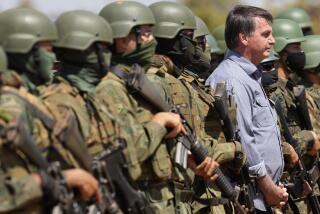Libyans Shop for Weapons in Brazil
- Share via
RIO DE JANEIRO — A delegation of Libyan colonels is in Brazil shopping for weapons, and Brazilian manufacturers hope to sell them tanks and missiles valued at up to $2 billion.
Until the Libyan colonels appeared this week, the talks had been kept quiet.
“American reactions against the sale of weapons to Libya led the two governments to negotiate secretly,” said Jornal do Brasil, one of the nation’s most influential newspapers.
On Wednesday and Thursday, the colonels met with the ministers of the army, air force and foreign affairs. On Friday, they toured plants at Sao Jose dos Campos, where most Brazilian weapons are manufactured. The leader of the delegation was identified as Col. Ahmed Mahmoud Ali, an adviser to Libyan leader Moammar Kadafi.
$1 Billion in Armored Cars
Brazil, a major exporter of military equipment to Third World countries, sold an estimated $1 billion worth of armored cars to Libya in the late 1970s and early 1980s. According to diplomatic reports, some of those vehicles were sent on to Iran for use in the war against Iraq, which is another Brazilian arms client.
Brazilian arms sales to Libya declined sharply in 1983 after Brazil detained two Libyan planes carrying arms for Nicaragua.
In their contacts with Libya, Brazilians are pushing a new medium-battle tank, the Osorio, and a variety of missiles, some still under development.
The Osorio was developed by Engesa S.A., a private arms manufacturer based in Sao Jose dos Campos. Engesa also has been trying to sell the Osorio to Saudi Arabia.
Under a proposed $5-billion deal, Saudi Arabia would buy 500 Osorios, another 500 would be assembled in Saudi Arabia with Brazilian components, and 500 more would be manufactured entirely in Saudi Arabia. The Saudis, apparently still considering European and American tanks, are hesitating on the Brazilian deal, according to diplomatic sources.
Short-Range Missiles Offered
Orbita, a company partly owned by Engesa, is offering Libya short-range missiles, including the air-to-air Piranha, which is similar to the U.S.-made Sidewinder. Brazilians also hope to get Libyan financial backing for the development of other missiles with ranges of 60 to 600 miles and warheads weighing up to a ton.
Brazilian newspapers have reported that Brazil and Libya are close to reaching a $2-billion sales agreement, which would include at least some payments in Libyan oil. But a spokesman for Engesa said, “I cannot confirm the sales.”
The Brazilian arms industry is hungry for sales. According to Jane’s Defense Weekly, a British publication, Engesa’s sales in 1987 were $500 million, half of the 1986 figure.
More to Read
Sign up for Essential California
The most important California stories and recommendations in your inbox every morning.
You may occasionally receive promotional content from the Los Angeles Times.










